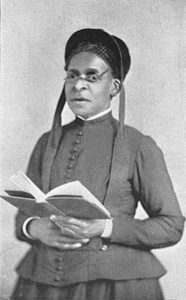
Julia Foote
*This date celebrates the birth of Julia A. J. Foote, a Black evangelist and author, in 1823.
Foote was born in Schenectady, New York, the daughter of former slaves. Her parents were firmly committed to Methodism and the education of their children. Because Schenectady's schools were segregated, Foote's parents hired her as a domestic servant to a white family who used their influence to place her in a country school outside the city. Here, between the ages of ten and twelve, Julia Foote received the only formal education of her life.
Despite her teenage years being devoted to caring for her younger siblings, she read considerably, especially in the Bible, and attended many church meetings. When she was fifteen, she had a profound conversion experience and joined an African Methodist Episcopal Church in Albany, New York. Three years later, she married George Foote, a sailor, and moved with him to Boston.
Having no children, Foote devoted much of her time to informal evangelistic work in her community, in which she testified to her belief in the doctrine of "sanctification." The controversial idea that a Christian could be sanctified, totally freed from sin, and empowered to lead a life of spiritual perfection had been under debate in Methodist circles for decades. Advocates of sanctification and perfectionism became leaders in the rise of "holiness" movements in evangelical denominations in the United States during the mid- and late-nineteenth century. Foote's belief that the Holy Spirit contributed to her had sanctified her growing conviction that her destiny was to become a preacher.
George Foote was skeptical about his wife's religious beliefs and attempted to curb her public activities; when she resisted his arguments, he drifted out of her life. Foote knew that a woman who claimed a divine calling to the ministry challenged Christian tradition and American social prejudice. In most Christian churches, women were not expected to assume public leadership positions, nor were they allowed to speak, except under restrictions. Yet Foote could neither deny her conscience nor shirk the work she felt had been given her. When the minister of her church in Boston refused her access to his pulpit and threatened to expel her from the congregation, she refused to be daunted. She took her case to higher denominational authorities, and when she received no support from them, she set out on an independent preaching career.
In the mid-1840s, she evangelized the upstate New York region, often accompanied or invited by ministers of the A.M.E. church. By 1850, she had crossed the Allegheny Mountains for new converts in Ohio and Michigan. She participated in the holiness revivals that swept the Midwest during the 1870s and later became a missionary in the A.M.E. Zion church. Julia A. J. Foote's autobiography, A Brand Plucked from the Fire (1879), represents many similar texts published by nineteenth-century black and white women who believed that Christianity had made them the spiritual equals of men and hence equally authorized to lead the church. Her belief in the androgyny of the Christian spirit and her refusal to defer to her husband or minister when her intuitive sense of personal authority was at stake mark Foote's autobiographical work as an essential early expression of the American feminist literary tradition.
During the last decade of her life, she became the first woman to be ordained a deacon and the second woman to hold the office of elder in her denomination. Although her autobiography attacks racism and other social abuses, the subordination of women, especially in the spiritual realm, and her desire to inspire faith in her Christian sisters endow her story with its distinctive voice and intensity. Julia A. J. Foote died in 1900.